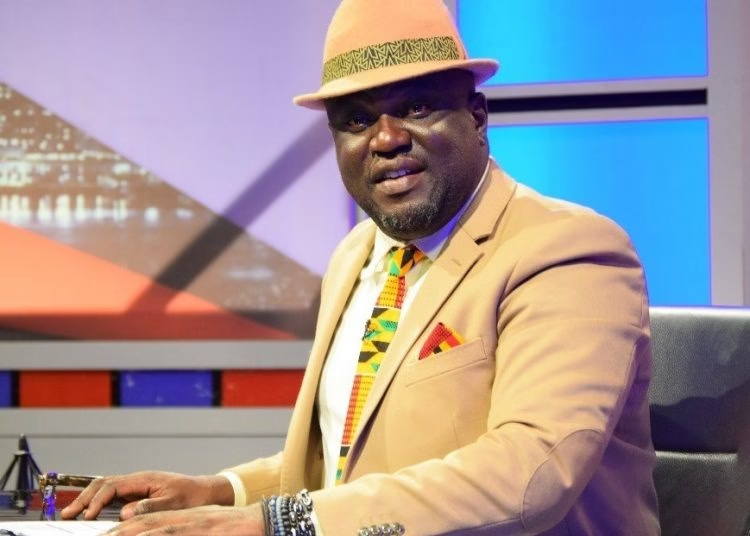Actor Mikki Osei Berko
Actor Mikki Osei Berko, widely known for his role as Dada Boat, has expressed deep concern over the growing prevalence of foreign content on Ghana’s national television station, the Ghana Broadcasting Corporation (GBC). In a heartfelt interview, Berko shared that it saddens him whenever he tunes into GBC and sees foreign shows taking center stage, especially considering that the station is the nation’s media flagship. According to him, the station’s primary responsibility should be to promote Ghanaian culture, entertainment, and the local movie industry.
The Challenge of Foreign Content
Ghana’s media landscape has long been dominated by foreign content. Berko points out that many TV stations, including the state-run GBC, feature an overwhelming amount of programming from other countries. He estimates that nearly 80% of the content aired on local television stations is foreign. This, he believes, is detrimental to the local movie and television industry, which struggles to gain the attention and support it deserves.
“Whenever I see GBC showing foreign content, it makes me shed tears,” Berko stated. He finds it disheartening to witness a national station, which is supposed to be a pillar of the country’s culture and identity, airing shows from abroad rather than focusing on homegrown content that reflects the diverse and rich Ghanaian experience.
Why Local Content Matters
For Berko, the issue is not just about entertainment or profit. He strongly believes that national television should serve as a platform to educate the public about Ghana’s history, culture, and values. He emphasizes the importance of promoting local talent and stories to both local and international audiences. By showcasing Ghanaian films, television series, and documentaries, GBC could help foster a stronger sense of national pride and unity, while also empowering the local entertainment industry.
“The people need to understand who we are as Ghanaians. We need to educate them about ourselves and our culture,” Berko explains. He believes that showcasing local content on national television would not only help in preserving Ghanaian traditions but would also allow the country to be better represented on the global stage.
While he acknowledges that foreign content might generate higher revenue and attract larger viewership due to its international appeal, Berko insists that the broader goal should be cultural representation, national identity, and local empowerment. “We must show the world who we are through our own stories,” he added.
GBC’s Role in Promoting Ghanaian Culture
The Ghana Broadcasting Corporation was established with the aim of being the country’s voice, providing a platform for the promotion of Ghanaian culture, education, and information. However, Berko argues that the station has drifted from this mission in recent years. He points to the fact that stations like GBC have followed the trend of private channels, which are increasingly relying on foreign content to fill airtime, often at the expense of local programming.
The actor is particularly concerned about the growing influence of foreign shows on young Ghanaian viewers, who may begin to view foreign cultures as superior to their own. “We are at a critical stage where our younger generation needs to appreciate the value of Ghanaian stories and culture. If we do not showcase these on television, who will?” Berko remarked.
A Call for Government Intervention
As the conversation about foreign content versus local programming continues to gain traction, Berko has called on the government to step in and help tackle this issue. He believes that effective policies and training programs need to be implemented to support the growth of the local film and television industry. Additionally, Berko suggests that the government should encourage media houses, including GBC, to prioritize Ghanaian content by offering incentives for local productions and providing more opportunities for upcoming filmmakers.
“Local content should be the focus, and GBC, as the national television station, should be leading the way,” he said. Berko also called for greater collaboration between the government, media houses, and industry stakeholders to create a conducive environment for local filmmakers to thrive. By doing so, he hopes that Ghana’s entertainment sector will experience a renaissance, one that can compete on an international level while celebrating its unique identity.
The Way Forward for the Ghanaian Movie Industry
Despite the challenges, Berko remains hopeful for the future of Ghana’s movie industry. He believes that with the right support, both from the government and the public, the country’s entertainment sector has the potential to thrive. However, this will require a concerted effort to create more opportunities for local talent, promote Ghanaian culture through media, and reduce the reliance on foreign content.
For Berko, the message is clear: the future of Ghana’s entertainment industry lies in promoting local content, nurturing local talent, and ensuring that national media outlets, particularly GBC, remain true to their original mandate of promoting Ghanaian culture.
As Ghana continues to grow as a cultural powerhouse in Africa, Berko’s call for more homegrown content reflects the larger conversation about preserving and celebrating local identity in the face of globalized media. It is a challenge that requires the collective effort of all stakeholders, from the government to media owners, to ensure that Ghanaian stories continue to be told — not just within the country, but to the world.



